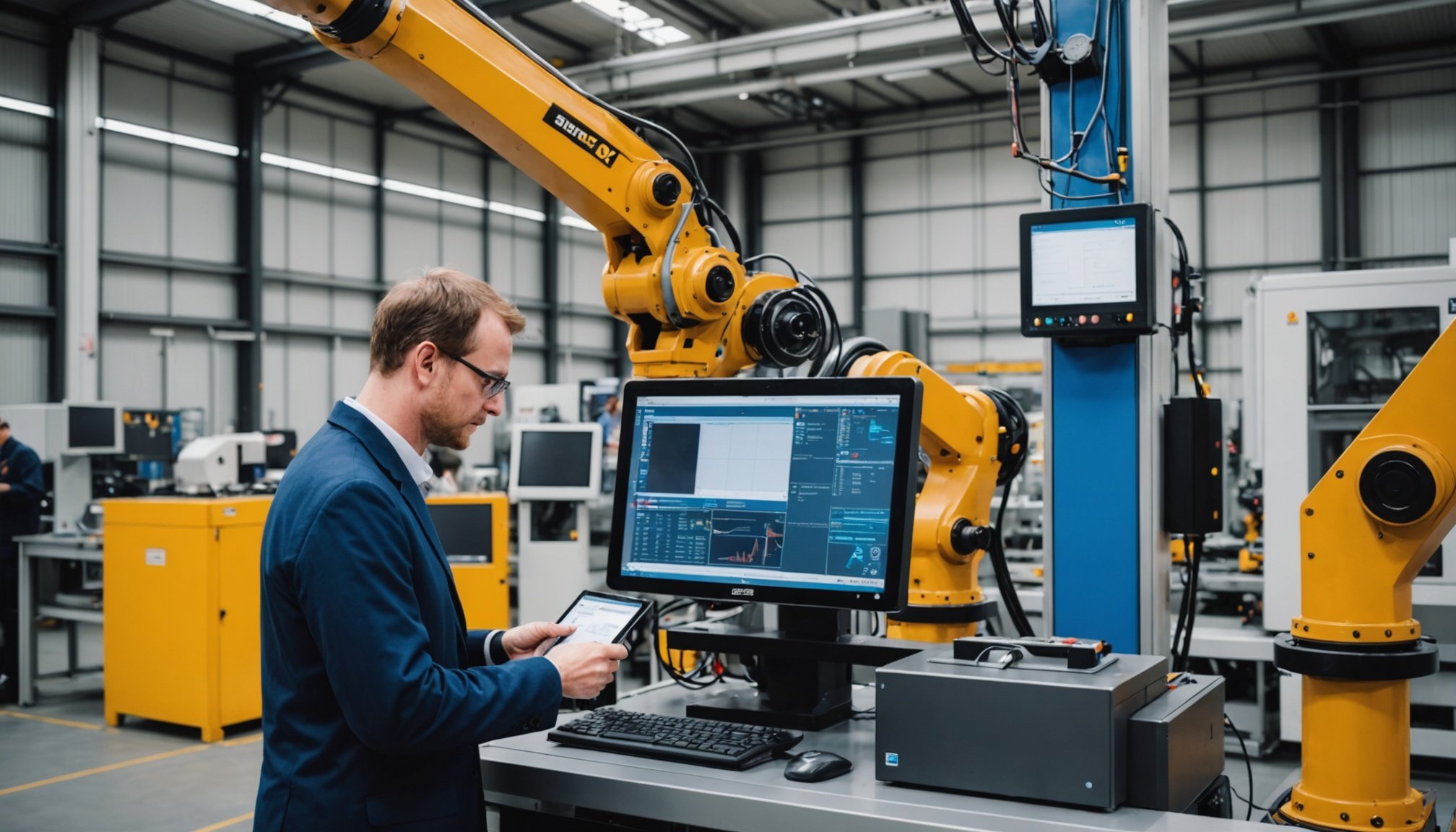Overview of Industry 4.0 and Its Importance to UK Manufacturers
Industry 4.0 marks the fourth industrial revolution, merging physical and digital technologies. It encompasses automation, cyber-physical systems, Internet of Things (IoT), and cloud computing. This transformation is crucial for UK manufacturers to remain competitive in a global market. By modernizing operations, businesses can boost efficiency and innovation, facilitating more agile manufacturing processes.
In recent years, UK manufacturers have increasingly recognized the need for technology adoption. Industry 4.0 technologies allow firms to optimize supply chains, improve product quality, and reduce downtimes through predictive maintenance. Notably, IoT sensors and AI-driven analytics are transforming production lines for better decision-making.
Also to discover : Luxury Hospitality in the UK: Innovative Strategies for Enhancing Sustainability Efforts
Current trends show a considerable shift towards digital integration, with manufacturers enhancing their data-driven capabilities. As businesses seek to bridge the gap between traditional methods and modernization, investing in Industry 4.0 tools becomes indispensable.
Moreover, smart factories employing interconnected devices and real-time data analytics are gaining traction, setting new standards in UK manufacturing. Staying abreast of these advancements is key to maintaining relevance and driving future growth. Despite potential challenges, embracing Industry 4.0 helps UK manufacturers harness the potential of emerging technologies for strategic advantage and increased operational efficiency.
In the same genre : Proven Tactics for UK Marketing Agencies to Excel in Shifting Consumer Landscapes
Key Technologies Driving Industry 4.0
Understanding the driving forces behind Industry 4.0 is crucial for any manufacturer aiming to enhance operational efficiency. One of the primary components involves automation, a concept that streamlines processes by reducing manual intervention and allowing machines to perform repetitive tasks. This transition not only saves time but also minimizes errors, contributing significantly to increased efficiency in production lines.
Another pivotal technology is the Internet of Things (IoT). IoT enables machines and devices to communicate seamlessly, sharing crucial data regarding the manufacturing process. This connectivity allows real-time monitoring and control, offering manufacturers the ability to detect issues promptly, thus mitigating potential downtimes.
Equally transformative is the role of Artificial Intelligence (AI) and data analytics in the manufacturing sector. Through sophisticated algorithms, AI and data analytics enable more informed and agile decision-making processes. By analyzing vast amounts of data, these technologies offer insights that can optimize resource allocation, forecast trends, and improve overall production strategies.
Collectively, these technologies not only redefine productivity but are also integral for accepting new industry standards. As UK manufacturers integrate these components, they set themselves up for sustained growth and innovation in a competitive global marketplace.
Strategies for Implementing Industry 4.0 Technologies
Implementing Industry 4.0 technologies requires carefully planned integration strategies. Initially, it is vital to conduct a thorough assessment of current capabilities within the organization. This evaluation helps identify which existing technologies and infrastructures are ready for upgrades and what gaps need bridging. Understanding these aspects forms the basis for effective implementation.
Following the assessment, building a comprehensive roadmap for technology adoption is essential. This roadmap should outline a phased plan, prioritizing which technologies to adopt first and allocating resources accordingly. By setting clear timelines and goals, manufacturers can systematically transition to a more technologically advanced operation while minimizing disruptions.
Additionally, training and upskilling the workforce is a critical element. As new technologies are introduced, employees must be equipped with the skills required to operate and manage these systems effectively. Continuous education programs ensure the workforce remains adept at leveraging the latest technologies, maximizing the benefits of Industry 4.0 adoption.
For best practices, companies should encourage a culture of innovation and flexibility, enabling seamless adaptation to ever-evolving technological landscapes. Embracing change and fostering an environment open to new ideas shields organizations from becoming obsolete in the competitive arena of UK manufacturing.
Challenges in Adopting Industry 4.0 Technologies
Adopting Industry 4.0 technologies can offer significant advantages, but it’s not without its challenges. UK manufacturers often encounter various barriers that hinder seamless implementation. A common obstacle is the significant investment required for new technology infrastructure, which can strain budgets, especially for small to medium-sized enterprises.
Another key challenge is organizational resistance to change. Employees may be apprehensive about the shift towards increased automation and reliance on IoT, fearing redundancy or a lack of job security. This resistance can slow down the adoption process, affecting overall efficiency.
To address these issues, leaders must foster a culture that embraces innovation. This involves transparent communication about how these changes will improve operational efficiency and competitive advantage. Engaging employees in the transformative journey and offering reassurances about their evolving roles can mitigate fears.
Furthermore, manufacturers should implement robust strategies to overcome these challenges. Establishing pilot programs can demonstrate the potential benefits on a smaller scale, alleviating hesitations. Continuous training and upskilling also play a crucial role, ensuring that the workforce is adept at utilizing new tools effectively. These strategies collectively assist in overcoming challenges and achieving a successful transition to Industry 4.0.
Case Studies of Successful Industry 4.0 Adoption in the UK
UK manufacturers have witnessed transformative results by embracing Industry 4.0 technologies. An exemplary case is that of a prominent auto manufacturer implementing IoT solutions to streamline operations and boost efficiency. By equipping production lines with IoT sensors, the company could monitor equipment health in real-time, drastically reducing downtimes through preventive maintenance.
Another success story highlights a leading electronics firm leveraging AI-driven analytics to elevate productivity. This integration allowed for precise forecasting and optimized resource allocation, leading to significant cost savings and improved production timelines. AI enabled smarter decision-making, effectively aligning manufacturing outputs with market demands.
Lessons learned from these ventures emphasize the importance of a strategic approach. Firstly, starting small and scaling up as results become evident helps in managing both risks and investments. Secondly, fostering a culture of adaptation and knowledge-sharing ensures workforce resilience to change, thereby facilitating smoother transitions.
These success stories showcase the profound impact of Industry 4.0 technologies on operational efficacy and innovation within the UK manufacturing sector. By following similar approaches, manufacturers can replicate these outcomes, enhancing their global competitiveness and preparing for future advancements in manufacturing technology.
Future Trends in Industry 4.0 for UK Manufacturing
As UK manufacturers forge ahead into the realm of Industry 4.0, anticipating future trends is vital. Technological advancements continue to shape the landscape, with innovation at the forefront. Upcoming technologies are set to offer transformative capabilities. Digital twins stand out as a key future trend. These virtual replicas provide real-time data, simulating physical processes for enhanced decision-making. By allowing predictive analysis, digital twins minimise disruptions, enabling smoother operations.
Advanced robotics promise to revolutionize manufacturing further. Robots are becoming more sophisticated, performing complex tasks with precision and flexibility. In the next decade, we can expect robots integrated with AI to handle intricate processes and adapt to changes dynamically.
Moreover, the continued growth of IoT offers widespread connectivity, fostering a new level of coordinated operations. This interconnectedness facilitates data-sharing and collaboration across production lines, enhancing overall efficiency.
Looking ahead, UK manufacturers are poised to witness a decade defined by innovation. To remain competitive, embracing these technological advancements will be crucial. By leveraging these trends, businesses can adapt swiftly, ensuring they not only survive but thrive in the evolving manufacturing landscape.
The Benefits of Embracing Industry 4.0
Industry 4.0 is set to transform UK manufacturing dramatically, offering significant benefits. Firstly, the adoption of these technologies results in enhanced productivity and efficiency. Automation and AI achieve quicker turnarounds with minimal errors, streamlining operations.
Moreover, firms that fully integrate Industry 4.0 technologies gain a distinct competitive advantage. By staying ahead of technology curves, companies can offer innovative products and services, distinguishing themselves in the marketplace. This advanced position also enables quicker responses to market changes, keeping businesses agile and adaptable.
The pursuit of long-term sustainability is another critical advantage. Industry 4.0 tools support greener manufacturing processes, reducing waste and resource consumption. As environmental regulations tighten, these capabilities will become increasingly valuable. Furthermore, with intelligent data analytics, firms can forecast demand and optimise resource use, promoting longevity and compliance.
For UK manufacturers, embracing these advancements not only secures immediate operational efficiencies but promises expansive growth opportunities. By adopting Industry 4.0 practices, firms ensure they remain relevant and competitive on an international scale, paving the way for sustained prosperity in an ever-evolving manufacturing landscape.











